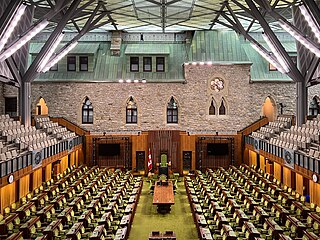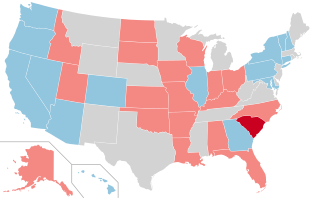 |
|---|
Parliamentary elections were held in Nicaragua on 7 October 1934 to elect half of the seats in the Chamber of Deputies and one-third of the seats in the Senate of the National Congress.
 |
|---|
Parliamentary elections were held in Nicaragua on 7 October 1934 to elect half of the seats in the Chamber of Deputies and one-third of the seats in the Senate of the National Congress.
| Party | Seats | |||||
|---|---|---|---|---|---|---|
| Chamber | Senate | |||||
| Liberal Party | 30 | 17 | ||||
| Conservative Party | 13 | 7 | ||||
| Total | 43 | 24 | ||||
| Source: Political Handbook of the World [1] | ||||||

Proportional representation (PR) refers to any type of electoral system under which subgroups of an electorate are reflected proportionately in the elected body. The concept applies mainly to political divisions among voters. The essence of such systems is that all votes cast – or almost all votes cast – contribute to the result so that each representative in an assembly is mandated by a roughly equal number of voters, and therefore all votes have equal weight. Under other election systems, a bare plurality or a scant majority are all that are used to elect candidates. PR systems provide balanced representation to different factions, usually defined by parties, reflecting how votes were cast. Where only a choice of parties is allowed, the seats are allocated to parties in proportion to the vote tally or vote share each party receives.
Sinn Féin is an Irish republican and democratic socialist political party active in both the Republic of Ireland and Northern Ireland.
A county seat is an administrative center, seat of government, or capital city of a county or civil parish. The term is in use in five countries: Canada, China, Hungary, Romania, and the United States. An equivalent term, shire town, is used in the U.S. state of Vermont and in several other English-speaking jurisdictions.

The House of Commons of Canada is the lower house of the Parliament of Canada. Together with the Crown and the Senate of Canada, they comprise the bicameral legislature of Canada.

A capital city or just capital is the municipality holding primary status in a country, state, province, department, or other subnational division, usually as its seat of the government. A capital is typically a city that physically encompasses the government's offices and meeting places; the status as capital is often designated by its law or constitution. In some jurisdictions, including several countries, different branches of government are in different settlements, sometimes meaning multiple official capitals. In some cases, a distinction is made between the official (constitutional) capital and the seat of government, which is in another place.

A coupe or coupé is a passenger car with a sloping or truncated rear roofline and typically with two doors.

The Lok Sabha, also known as the House of the People, is the lower house of India's bicameral Parliament, with the upper house being the Rajya Sabha. Members of the Lok Sabha are elected by an adult universal suffrage and a first-past-the-post system to represent their respective constituencies, and they hold their seats for five years or until the body is dissolved by the president on the advice of the council of ministers. The house meets in the Lok Sabha Chambers of the Parliament House, New Delhi.

The Communist Party of India (Marxist) (abbreviated as CPI(M)) is a communist political party in India. It is the largest communist party in India in terms of membership and electoral seats, and one of the six national parties of India. The party was founded through a splitting from the Communist Party of India in 1964 and it quickly became the dominant faction.
An electoraldistrict, sometimes called a constituency, riding, or ward, is a geographical portion of a political unit, such as a country, state or province, city, or administrative region, created to provide the voters therein with representation in a legislature or other polity. That legislative body, the state's constitution, or a body established for that purpose determines each district's boundaries and whether each will be represented by a single member or multiple members. Generally, only voters (constituents) who reside within the district are permitted to vote in an election held there. The district representative or representatives may be elected by single-winner first-past-the-post system, a multi-winner proportional representative system, or another voting method.

The 1982 United States House of Representatives elections was an election for the United States House of Representatives held on November 2, 1982, to elect members to serve in the 98th United States Congress. They occurred in the middle of President Ronald Reagan's first term, whose popularity was sinking due to economic conditions under the 1982 recession. The President's Republican Party lost seats in the House, which could be viewed as a response to the President's approval at the time. Unlike most midterm election cycles, the number of seats lost—26 seats to the Democratic Party—was a comparatively large swap. It included most of the seats that had been gained the previous election, cementing the Democratic majority. Coincidentally, the number of seats the Democrats picked up (26), was the exact amount the Republicans would have needed to win the House majority. It was the first election held after the 1980 United States redistricting cycle.

The 1962 United States House of Representatives elections was an election for the United States House of Representatives on November 6, 1962, to elect members to serve in the 88th United States Congress. They occurred in the middle of President John F. Kennedy's term. As in most midterm elections, Kennedy's Democratic Party lost seats to the opposition Republican Party, but retained a majority. House Democrats were expected to lose their majority, but the resolution over the Cuban Missile Crisis just a few weeks prior led to a rebound in approval for the Democrats under President Kennedy.

The 2005 United Kingdom general election was held on Thursday 5 May 2005, to elect 646 members to the House of Commons. The governing Labour Party led by Prime Minister Tony Blair won its third consecutive victory, with Blair becoming the second Labour leader after Harold Wilson to form three majority governments. However, its majority fell to 66 seats; the majority it won four years earlier had been of 167 seats. The UK media interpreted the results as an indicator of a breakdown in trust in the government, and especially in Blair.

The 2010 United Kingdom general election was held on Thursday 6 May 2010, to elect Members of Parliament to the House of Commons. The election took place in 650 constituencies across the United Kingdom under the first-past-the-post system. This was the first election held after the age of candidacy was reduced from 21 to 18. The election resulted in a large swing to the opposition Conservative Party led by David Cameron similar to that seen in 1979, the last time a Conservative opposition had ousted a Labour government. The governing Labour Party led by Prime Minister Gordon Brown lost the 66-seat majority it had previously enjoyed, but no party achieved the 326 seats needed for a majority. The Conservatives won the most votes and seats, but still fell 20 seats short. This resulted in a hung parliament where no party was able to command a majority in the House of Commons. This was only the second general election since the Second World War to return a hung parliament, the first being the February 1974 election. This election marked the start of Conservative government for the next 14 years until the July 2024 Election.
An independent politician or non-affiliated politician is a politician not affiliated with any political party or bureaucratic association. There are numerous reasons why someone may stand for office as an independent.
The New Democratic Party is a federal political party in Canada. Widely described as social democratic, the party sits at the centre-left to left-wing of the Canadian political spectrum, with the party generally sitting to the left of the Liberal Party. The party was founded in 1961 by the Co-operative Commonwealth Federation (CCF) and the Canadian Labour Congress (CLC).

The 2024 United States Senate elections were held on November 5, 2024. Regularly scheduled elections were held for 33 out of the 100 seats in the U.S. Senate, and special elections were held in California and Nebraska. U.S. senators are divided into three classes whose six-year terms are staggered so that a different class is elected every two years. Class 1 senators faced election in 2024. Republicans flipped four Democratic-held seats, regaining a Senate majority for the first time in four years.

The 2026 United States Senate elections are scheduled to be held on November 3, 2026, with 33 of the 100 seats in the Senate being contested in regular elections, the winners of which will serve six-year terms in the United States Congress from January 3, 2027, to January 3, 2033. Senators are divided into three groups, or classes, whose terms are staggered so that a different class is elected every two years. Class 2 senators were last elected in 2020 and will be up for election in this cycle.

The 2028 United States Senate elections will be held on November 7, 2028, with 34 of the 100 seats in the Senate being contested in regular elections, the winners of which will serve 6-year terms in the United States Congress from January 3, 2029, to January 3, 2035. Senators are divided into 3 groups or classes whose terms are staggered so that a different class is elected every 2 years. Class 3 senators were last elected in 2022, and will be up for election again in 2028. These elections will run concurrently with the 2028 United States presidential election.

The 2024 United States House of Representatives elections were held on November 5, 2024, to elect the 435 representatives of the United States House of Representatives, as well as 6 non-voting delegates from the District of Columbia and inhabited U.S. territories. The elections were held together with other federal, state, and local elections, including the U.S. presidential election and elections to the Senate, as part of the 2024 United States general election. The winners of this election will serve in the 119th United States Congress, with seats apportioned among states based on the 2020 United States census.